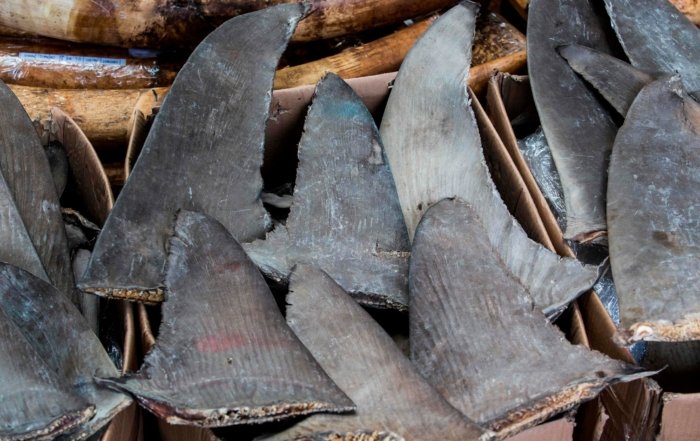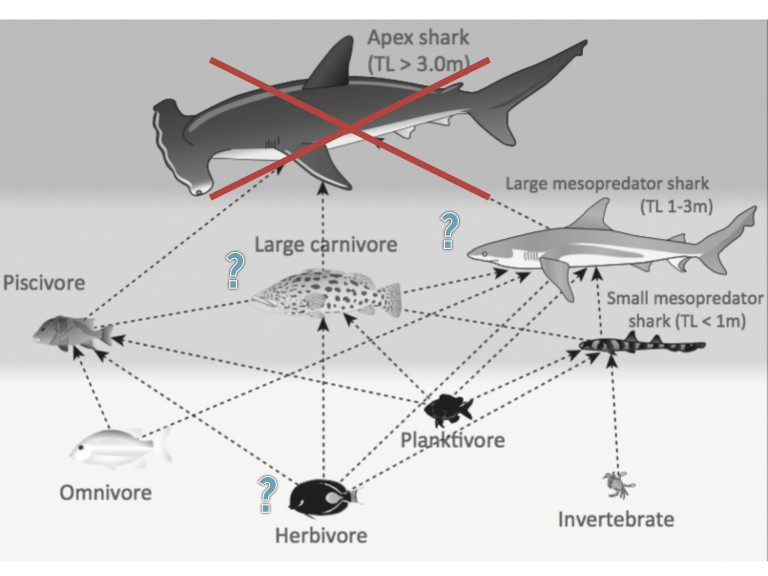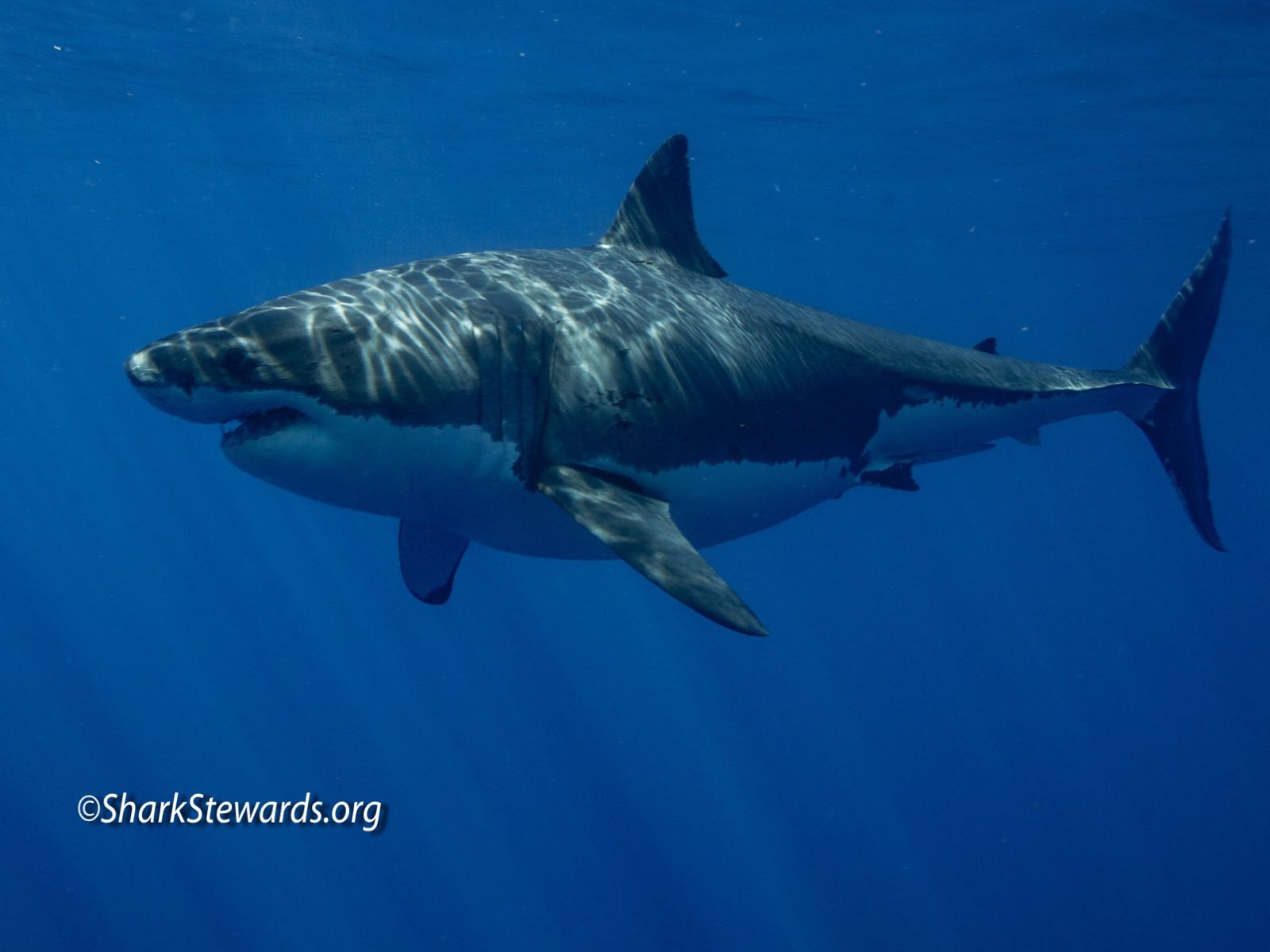The shark fin trade, a global act, and an influencer on our ecosystems sustainability.
05 May 2021
by Shark Stewards Volunteer Ashley Joyner
for Professor Wilcox, English 102
Essentially, the shark fin trade involves the negotiation of attaining shark’s fins by global
marketers in exchange for money. Even though it is considered unlawful for a U.S. fisherman to
return from fishing without the shark’s fins naturally attached to its carcass, whether or not
participating in the global shark fin trade should be banned has been discussed by Americans for
many years. In the words of National Geographic explorer Jason Bittel, “From 2010-2017, the
United States unintentionally played middleman to somewhere between 650 and 772 tons of
shark fin exports, accounting for as many as 1.29 million sharks.”
Evidently, The United States has a hand in the trade. Some Americans believe the demand for shark fins is greater than the supply and that the shark fin trade harms our ecosystem, while others believe that retrieving shark fins is an important factor in maintaining tradition. In effect to this, there are multiple
standpoints that either encourage or oppose the ban of participation in the shark fin trade.
However, after careful research, it is clear that placing a ban on the shark fin trade would result
in many positive outcomes that would benefit both humans and marine animals. The shark fin
trade should be banned because it would lead to a healthy shark population once more, a stable
ecosystem as a whole, and the cease of inhumane actions.

Banning the shark fin trade would allow the shark populations to rise back to a healthy
level. The popularity of shark fins in the market has led to a high motive for fishermen to
overfish sharks solely for their fins. The overfishing has caused some species of sharks to be at
risk of extinction. According to Caty Fairclough, an ocean Smithsonian journalist, “Many
species of sharks are currently in danger due to shark finning, including the scalloped
hammerhead, which is endangered, and the smooth hammerhead, which is vulnerable according
to the International Union for the Conservation of Nature.”
The shark fin trade has caused these unique shark species populations to diminish. With a ban on the trade put in place, their populations would be able to make a slow but steady comeback, which would allow us to observe and appreciate their species at full potential once more. Additionally, in an international law review provided by Crystal Green, an attendant of Pace University School of Law, it says
that “In recent years, however, shark populations have plummeted, with many shark species
populations being estimated at less than ten percent of their original levels.”. Evidently, the
increasingly popular trade has led to critically low amounts of sharks in the water. Banning the
action of the United States taking part in the trade would subtract a piece of the puzzle from the
equation and help sharks get relief from overfishing.
For example, in an interview I conducted with David McGuire, a well respected marine biologist and the founder of the non profit Shark Stewards, he states that, “These are (American) commercial fishermen making more money off the fins, and they’ve said it themselves, if the fins were illegal to sell, they wouldn’t fish the sharks. So, the United States is part of the problem in the global shark fin trade. We are also large traders in imports and exports.”. Introducing a shark fin trade ban would help eliminate the U.S.
from the global problem. With an entire country withdrawn from the trade, the sharks are given some grace to live full natural lives. Although the sharks do suffer the most in this issue, the
shark fin trade does not only affect sharks, but the whole ecosystem.

A ban on the shark trade would help keep the ecosystem stable. The low level of sharks
in the oceans has a detrimental effect on the ecosystem as a whole. For instance, the University
of Miami’s organization SRC (Shark Research and Conservation) led by marine biologist Dr
Neil Hammerschlag says that “Our research team found that across reefs where sharks have been
depleted, prey fishes had significantly smaller caudal fins and eyes compared to the reefs with
intact shark populations (up to 40 and 46% relative difference in standardized means).”. Without
a healthy level of sharks in the ocean, the balance of the food web is disrupted. The low level of
predatory species then leads to unnatural formations in marine animals that are lower on the food
web. The smaller fish rely on the bigger fish to keep things steady and without the sharks, the
ecosystem is thrown out of balance. These changes are dangerous to the effort of maintaining a
stable ecosystem. Sharks are known as apex predators; the only other creature that hunts them
are primarily other sharks. In effect to this, their main job in the ocean is to regulate the
populations of other marine life. Think of a tower of cards, each card needs the other to remain
structured and efficient. The food web is very similar. When sharks are removed from this tower,
the whole delicate foodweb falls apart. Tom Slough, a Marine Biologist employed at White
Shark Projects says that, “They (Sharks) do this by keeping the predatory species that they prey
on at a healthy but balanced number. This in turn keeps the species below their prey balanced
and so on. This balance flows down the food chain even affecting oxygen levels (remember
every 2nd breath we take comes from the ocean!).”(Slough). The absence of sharks affects
everyone- from the smallest crustacean to the friendly giants the blue whales.

Placing a ban on the shark fin trade would allow the wide variation of sea life in the ecosystem to thrive. Beyond
other marine creatures, sharks’ livelihood affects human health and progress as well.
The shark fin trade needs to be banned because the fins that are being traded are gathered
by inhumane actions. As humans we believe we have progressed past savage and inhumane ways
of gathering our food. However, the shark fin trade gives fishermen a motive to engage in shark
finning. Shark finning is the most common practice used to attain the fins in the trade. Fishermen
are tempted to use this technique because all of the value is in the shark’s fin. Shark finning is
done by cutting off the shark’s fins while it is still alive, and then discarding its body back into
the ocean, where it dies a slow death. In an interview done by a journalist named Michael Sharp,
he asks Rebecca Regenery, the deputy director of wildlife at Humane Society International what
shark finning is like. She says that, “It’s like cutting off your limbs and leaving you to bleed to
death.”. (Regenery). Shark finning does not catch the shark in a humane way. Fishermen
shouldn’t continue to fish sharks in these conditions because it lacks respect for life. Having a
shark fin trade ban would eliminate fishermen’s motivation to fish sharks inhumanely. A healthy
shark population, a stable ecosystem, and the desire to stop inhumane actions on wildlife are all
valid reasons why there should be a ban on the shark fin trade, However; there are convincing
points made why there should not be a ban on the shark fin trade.
The first argument that opposes a ban on the shark fin trade is the fact that it would mean
that an ancient tradition in Chinese culture wouldn’t be carried on for future generations. Shark
fins are used in a delicacy dish called shark fin soup. They are the main component in the dish.
Shark fin soup is only served on extravagant occasions, or eaten to show one’s high status.
According to Rachel Fobar, a journalist for National Geographic, “Shark fin soup has long been
a status dish in Asian countries, notably China, where its use can be traced back to an emperor the Song Dynasty (960-1279) who is thought to have invented the dish to show off his
power and wealth.”. There is a rich history behind the delicacy of shark fin soup. Today it is
commonly served at extravagant events like weddings to show the depth of one’s love. A ban on
the shark fin trade would not allow Chinese Americans or Americans that admire Chinese culture
to participate in the tradition of serving shark fin soup at celebrations. It is clear that shark fin
soup is eaten as a cultural tradition in Asian countries; However, ceasing to eat shark fin soup
would not only help the sharks. Shark fin soup is proven to have high levels of the dangerous
neurotoxin B-N-methylamino-L-alanine (BMMA) and mercury within it. These toxins have been
linked to the formation of various neurodegenerative diseases. Alzheimer’s disease and dementia
are just two of the diseases that can be an effect from consuming high levels of BMMA and
mercury. Recent studies have proven that shark fins contain these toxins. For instance, Neil
Hammerschlag, a researcher for National Geographic says that, “The study detected
concentrations of mercury and BMAA in the fins and muscles of all 10 shark species evaluated
at levels that may pose a threat to human health. While both mercury and BMAA by themselves
pose a human health risk, together they may also have synergistic toxic impacts.”
(Hammerschlag). Evidently, consuming shark fins is a detriment to not only sharks, but humans
as well. Even though the serving of shark fin soup is an ancient tradition, it is proven to not be
healthy for its consumers and it should not be eaten any longer due to health risks.

The second reason why some believe that there should not be a ban made on the shark fin
trade is that it would hurt the economy. The shark fin trade is a very popular market. In a news
article written by Jordan Culver in the USA Today the author says that, “The estimated
commercial value of the fins, considered a delicacy in parts of the world, is between $700,000
and $1 million, an official said in an email to USA TODAY.”. Shark fins bring in lots of revenue
for the economy. The revenue made helps the country function and work to the best of its ability.
If a ban was established, all of that money made through the trade would be gone. This would
hurt the economy with the sudden halt on money flow from the shark fin trade, and the U.S.
would have to rely on other means to fill the gap. However, relying on other means is precisely
what the U.S. would do. The U.S. has a very competitive market. The shark fin trade would
instantly be filled with other revenue from another trade. In other words, the shark fin trade
revenue is easily replaceable.
Lastly, another reason why some are against placing a ban on the shark fin trade is that it
would limit our connection with other countries and cause more damage to sharks than not
having a ban. America is a role model in advocating shark conservation, and without being in the
circle of the trade, there would be no regulation. For example, according to Chris Oliver, the
NOAA Fisheries Assistant Administer, “Responsibly participating in the global fin trade allows
the United States to showcase our strong conservation and management practices overseas”.
America demonstrates regulated shark fin trading that in time other countries might follow. If
participating in the shark fin trade was banned, America would not be able to advocate
responsible shark fishing. However, no longer participating in the shark fin trade wouldn’t
actually cut us off from other countries. America is in fact a role model for many countries and
making the decision to stop participating in the shark fin trade would cause a ripple effect and
possibly lead to other countries deciding to ban the shark fin trade as well. Separate countries
deciding as one to ban the shark fin trade is more unified than staying quiet in fear of
disconnection.
There are many reasons why there should be a ban on the shark fin trade. New research is
constantly being done by shark conservationists and marine biologists that discover more and
more reasons why we need to protect the shark species and keep our ecosystem sustainable. It is
imperative that we make choices based on fact and logic while deciding whether or not placing a
ban on the shark fin trade is good or bad. Tallied together, the logic points in favor of a shark fin
trade ban in order to protect the shark species and our oceans.
References
Culver, Jordan. “About 1,400 Pounds of Shark Fins, Worth Nearly $1 Million, Seized by
Officials in Florida.” USA Today, Gannett Satellite Information Network, 5 Feb. 2020,
www.usatoday.com/story/news/nation/2020/02/04/1400-pounds-shark-fins-worth-nearly1-million-seized-miami/4660256002/.
Fairclough, Caty. Shark Finning: Sharks Turned Prey, 14 May 2018,
ocean.si.edu/ocean-life/sharks-rays/shark-finning-sharks-turned-prey#:~:text=Today,som
e shark populations have,due to human shark fisheries.&text=Such dramatic population
plunges are,the rest of the ecosystem.
Fobar, Rachel. Shark Fin is Banned in 12 U.S. States-but its Still on the Menu, Animals, National
Geographic, 10 February
NationalGeographic.com/animals/article/restaurants-sell-shark-fin-ban
Green, Crystal. An International SOS (Save Our Sharks): How the International Legal
Framework Should Be Used To Save Our Sharks. Molstead Library, 14 July 2014
http://web.b.ebscohost.com.ezproxy1.nic.edu:2048/ehost/pdfviewer/pdfviewer?vid=5&si
d=89b2c87b-f7d3-407b-bf74-f1505bb263d0%40pdc-v-sessmgr03
Hammerschlag, Neil. How and Why Consuming Shark Fins and Meat Can Put both Humans and
Sharks at Risk, National Geographic, 07 October,
https://blog.nationalgeographic.org/2016/10/07/how-why-consuming-shark-fins-meat-can
-put-both-humans-and-sharks-at-risk/#:~:text=The%20study%20detected%20concentrati
ons%20of,also%20have%20synergistic%20toxic%20impacts.
Mcguire, David. Interview. By Ashley Joyner. 25 February 2021.
Oliver, Chris. Shark Fin Sale Bans Would Hurt U.S. Fishermen without Improving Shark
Conservation, Management. NOAA,
www.fisheries.noaa.gov/leadership-message/shark-fin-sale
Regenery, Rebecca. Shark Finning: The Cruelest Cuts, 2021. The Humane Society of the United
States, www.\humanesociety.org/resources/shark-finning-cruelest-cuts.
Shark Research & Conservation Program (SRC). Assessing the Cascading ecosystem impacts of
marine predator declines as a result of overfishing | University of Miami,
sharkresearch.rsmas.miami.edu/research/projects/ecosystems-impacts-of-overfishing/.
Slough, Tom. “The Importance of Sharks.” White Shark Projects, 29 June 2020,
www.whitesharkprojects.co.za/news/the-importance-of-sharks/.
Trophic Cascade Image
Roff, G., C. Doropoulos, A. Rogers, Y.-M. Bozec, N. C. Krueck, E. Aurellado, M. Priest, C. Birrell, and P. J. Mumby (2016), The Ecological Role of Sharks on Coral Reefs, Trends in Ecology & Evolution, 31(5), 395–407, doi:10.1016/j.tree.2016.02.014.